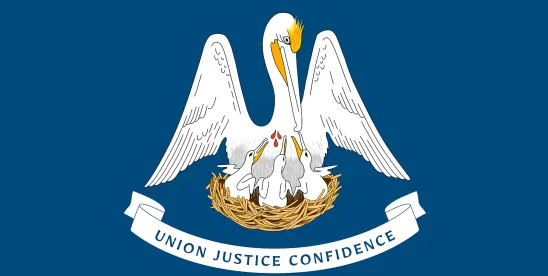The Louisiana Assessor’s Association (LAA) has proposed revisions to the Regulations promulgated by the Louisiana Tax Commission (LTC) that will be applicable to all property tax assessments and procedures beginning for the Tax Year 2026.
There are a number of revisions proposed by the LAA, but this notice focuses on two that will greatly impact taxpayers that have business assets in Louisiana, and all taxpayers that seek to present appraisals or other reports prepared by an expert regarding the value of their property. In fact, if the proposed revisions to the Regulations are adopted by the LTC, it would practicably be impossible for a taxpayer to comply with the proposed Regulations so that an appraisal is admissible evidence at an LTC hearing.
Proposed Procedural Changes: Chapter 31 Appeals
With respect to the procedures that will be employed by the LTC during appeals of assessments, which are contained in Chapter 31 of the LTC’s Regulations, the LAA has proposed several amendments that would be to the detriment of taxpayers.
First, the LAA has proposed to change the Regulations with respect to the requirement that an assessor object to the admissibility of a taxpayer’s evidence by a certain date or waive any objection to the LTC’s consideration of that evidence. Instead, the LAA proposes that a “late” filed objection could be considered if the assessor shows “good reasons” for the failure to timely object. Under the current rules, the failure to timely object results in a waiver of all objections and allows the evidence to be considered by the LTC. There is no definition of what the LTC might consider to satisfy the “good reason” standard.
Next, LAA also proposes to amend Section 3103(G)(1), which currently provides in the LTC’s Regulations as follows:
The commission shall conduct an evidentiary hearing to evaluate the correctness of the Board of Review’s determination. However, if the Board of Review affirms the original assessment/value, the commission shall evaluate the original assessment/value by the assessor. The commission will not accept or consider any evidence not permitted under La. R.S. 47:1989.
In claiming that the above language is “broader” than the actual statute, the LAA proposes to amend Section G(1) to read as follows:
All appeal hearings shall be conducted in accordance with La. R.S. 47:1989 and the Administrative Procedure Act. The Commission will not accept or consider any evidence not permitted under La. R.S. 47:1989.
As has been the case for several years, the LAA seeks to focus the LTC’s review on the assessor’s act of assessing and the evidence available to the assessor at that sole point in time. Again, this proposed revision would narrow the focus of any appeal to the LTC or the courts to the Assessor’s actions.
Finally, the most significant revision proposed by the LAA relates to their attempt to place further restrictions on the data and information that a taxpayer can utilize in obtaining an appraisal from a third-party or any other expert and seeks to limit the statutory language in Section 1989 that specifically provides the timeline for the admission of an appraisal into evidence at the LTC. Currently, La. R.S. 47:1989(C)(2)(a)(ii) specifically provides that if an appraisal is “ordered” prior to the deadline for filing a complaint with the local Board of Review, and it is received by the taxpayer and provided to the assessor and the LTC on a specific timeline, “good reason” for the failure to provide the appraisal or other expert reports prior to the Board of Review hearing deadline “shall be presumed.” The full text of La. R.S. 47:1989(C)(2)(a)(ii) provides as follows:
For purposes of this Subparagraph, good reason for failure to timely present information to the assessor shall be presumed to exist for reports and related attachments of any appraiser or other expert ordered prior to the deadline for filing a complaint with the board of review if the report and attachments are submitted to the assessor within thirty days of receipt of the reports and attachments by the taxpayer and at least twenty-five days prior to a hearing before the Louisiana Tax Commission. Nothing in this Item shall be construed to limit the ability of the Louisiana Tax Commission to find good reason to admit other expert reports pursuant to the other paragraphs in this subsection.
In their proposal, the LAA seeks to essentially write that language out of the statute and impose an impossible burden upon a taxpayer with respect to an appraisal or other expert report. Specifically, the proposal would require that any data ultimately relied upon by the appraiser or any other expert in their report have been provided to the assessor prior to the deadline for filing a complaint with the local Board of Review, if it was available to the taxpayer at that time. The proposal would further restrict the LTC’s ability to consider any part of the report that was based upon data that was available to the taxpayer prior to the appeal deadline but not provided to the Assessor.
The total proposed change by the LAA is as follows:
(b) Good reason for failure to timely present evidence to the assessor under La. R.S. 47:1989(C)(2)(a)(ii) shall be presumed to exist for reports and related attachments of any appraiser or other expert ordered prior to the deadline for filing a complaint with the Board of Review if the report and attachments are submitted to the Assessor within thirty days of receipt of the reports and attachments by the taxpayer and no later than the deadline for filing and serving papers and documents that may be offered into evidenced set forth in Paragraph G.6 of this section. Reports from the appraiser or other experts shall be deemed ordered when an appraiser or other expert is authored to commence to work on the report. The commission does not utilize factual data which was available to the taxpayer yet withheld from the assessor and any evidence submitted as an attachment to a report which is available to the taxpayer but not presented to the assessor prior to the deadline for filing a complaint with the board of review and any portion of a report based on such evidence shall not be considered absent a showing that there were good reasons for failure to timely present such evidence of the Assessor.
As the language emphasized above clearly demonstrates, any appraisal or other expert report regarding the fair market value of property can only be based upon (1) data that existed and was available to the taxpayer prior to the deadline to file at the Board of Review; and (2) that the taxpayer provided to the assessor prior to that deadline.
Since each type of industrial property in the various applications has different drivers of value, and their markets and operating margins are different, it is difficult, if not impossible, for a taxpayer to know what type of data an appraiser might request or need to perform an appraisal of their specific industrial property until the appraiser is engaged. However, under this proposal, a taxpayer must either “dump” raw data on the assessor that an appraiser might want to use later or be unable to receive a complete USPAP-compliant appraisal later. Moreover, since most “fee” appraisals utilize all three approaches to value, and taxpayers likely do not want to provide income and expense data, except under very specific and controlled circumstances, it is likely that no taxpayer would ever be able to rely on an income approach to value an industrial property. Further, because of the less strenuous confidentiality statutory requirements placed upon property tax reporting, a taxpayer would be less likely to provide that data without assurances that the data would not be publicly available through the Assessor’s office.
Proposed Changes to Chapter 25: General Business Assets
Chapter 25 provides the guidelines for ascertaining the fair market value of general business assets, including machinery and equipment utilized in various industrial and commercial operations. Chapter 25 provides tables that establish the methodology for determining the fair market value of general business assets, and those tables are categorized by specific application, such as machinery and equipment used in the chemical industry, the construction industry, the gaming industry, the forest products industry, and the refining industry. Regardless of the formulaic approach to valuation provided by Chapter 25, the Regulations have always provided a specific exception in Section 2501(F), that provides as follows:
Nothing in this Section prohibits a taxpayer/property owner from arguing and submitting evidence that the tables contained in this Chapter fail to achieve fair market value in a particular appeal. A taxpayer/property owner has the burden to prove that a deviation from the tables contained in this Chapter is necessary to achieve fair market value.
The LAA proposes to delete this provision in its entirety. During the presentation of this proposed change, LAA representatives stated its view that it was not fair for taxpayers to be able to deviate from the tables when the assessors could not. Regardless of the motive for the proposed change, if Section F as quoted above, is deleted from the Regulations, taxpayers will be bound by the specific tables and guidelines in Chapter 25 to determine the fair market value of their general business assets. As Chapter 25 is a fairly standard “replacement cost new less depreciation” formula, an intervening “sale” of the assets or other changes in the value of the assets could not be offered by a taxpayer to lower the fair market value of those assets.
Conclusion
Based upon the foregoing, we highly recommend that taxpayers engage with their government relations and property tax personnel to review these proposed amendments to the current Regulations and provide a response as soon as possible objecting to the changes and asking that the LTC rely instead upon the actual statutes enacted by the Legislature and their prior practices.




 />i
/>i
